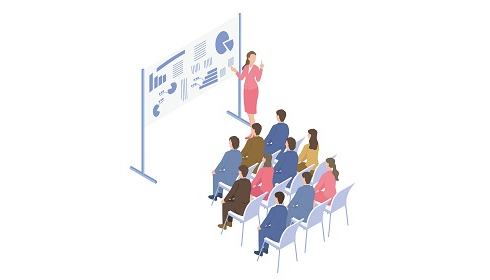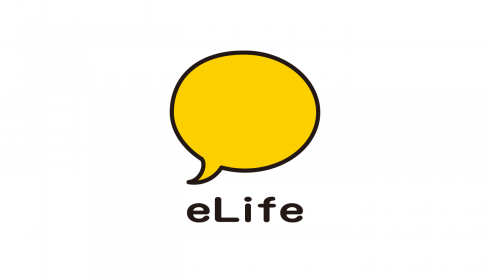Consumers are partners to the company - a basic concept of eLife Inc.: What is "PRM"?
This is a marketing column in which we at eLifepresent the ideas we value along with the history of our company.
Following the previous article, " Basic Concepts of eLife: What is CSA? Following the previous column, "What is eLife?", our CMO, Maki Sugiyama, will introduce the basic concept of What is PRM? This time, our CMO, Maki Sugiyama, will delve deeper into the concept of "partnering," while introducing our efforts since the company's inception.
What is a partner?
Along with the " CSA" *1 introduced in the previous issue, one of the ideas that eLife values are that of "partners". *1 CSA is a term coined by combining the initials of Creator, Supporter, and Audience, and is the basic concept of eLife when proposing community building.
A "partner" is someone with whom we collaborate to achieve the same goal. For example, other corporate organizations with which we jointly operate businesses and freelancers whom we request to work on a project-by-project basis are important "partners" for us. But what we are trying to convey here is a step further than that. Consumers are also "partners" of the company.
Nescafe Ambassador" by Nestlé Japan
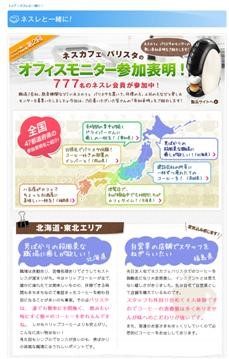 When we explain the concept of "partner," we always cite as an example the "Nescafe Ambassador" campaign by Nestlé Japan, our business partner since the company's establishment. Nescafe Ambassador is a campaign that Nestlé Japan has been running since 2012 to promote the use of the Nescafe Varistor home-use coffee machine in offices.
When we explain the concept of "partner," we always cite as an example the "Nescafe Ambassador" campaign by Nestlé Japan, our business partner since the company's establishment. Nescafe Ambassador is a campaign that Nestlé Japan has been running since 2012 to promote the use of the Nescafe Varistor home-use coffee machine in offices.
People are recruited to represent the office, purchase Nescafe products, and introduce the products to their colleagues, and appointed as "Nescafe Ambassadors". In exchange for receiving a free Nescafe Varistor, if they meet certain conditions, Ambassadors are responsible for installing a Varistor in their workplace, answering regular surveys, and purchasing and replacing special cartridges.
In fact, the original idea for the "Nescafe Ambassador" came from buzzLife, a word-of-mouth platform operated by our company.
Word-of-mouth platform " buzzLife"
 The " buzzLife" is, simply put, our consumer monitoring system. However, it is somewhat different from a normal consumer monitor.
The " buzzLife" is, simply put, our consumer monitoring system. However, it is somewhat different from a normal consumer monitor.
The most significant difference is that the consumers who gather there are assigned some role to play, such as recommending product samples sent to them for their friends to try and reporting in detail their impressions and reactions from their friends.
eLife Inc. " buzzLife", each project on " " is called a "project" and the role assigned to consumers is called a "mission". As symbolized by these names, " buzzLife" can be said to be a mechanism for companies to ask consumers to do a certain kind of "job" for them.
However, although we call it a "job," there is no monetary compensation. From the consumers' point of view, there is, of course, the advantage of receiving product samples for free, but that is the same for general consumer monitors other than " buzzLife". However, it is definitely a hassle because some kind of "work" is added to it.
Therefore, when we started this initiative in 2006, we were skeptical that we would probably not be able to attract that many people. However, when we opened our doors, we found that many more people had gathered than we had expected. They came to us and said, "Please let us do this.
Why do people participate in "missions"?
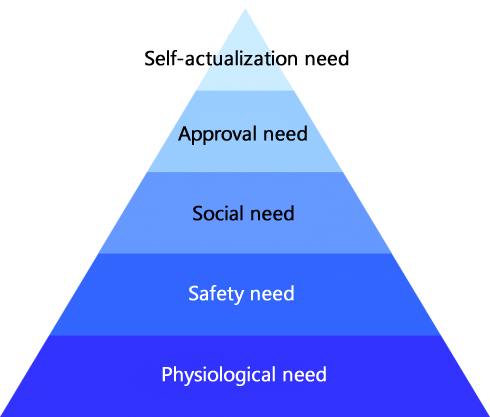
Maslow's five-level desire
Why do so many people agree to cooperate with us even though there is no charge? The answer to this question is still unclear, even after nearly 20 years of operation since the experimental project was formally structured as " buzzLife.
However, there is a possible, if hypothetical, explanation. It is possible that these consumers are getting a certain sense of fulfillment by playing a part in corporate projects and feeling that they are contributing to the betterment of society, for example. Our hypothesis is that they are fulfilling higher-level needs, such as social needs, the need for approval, and the need for self-actualization, as described in Maslow's five-step theory of needs.
In fact, those who participated in the initial "Nescafe Ambassador" program had to do many missions without pay in order to install a Barista in their own office. First, they had to get permission from the president or their boss to install a Barista, and even after installation, they had to teach their boss and colleagues how to use the machine, perform daily maintenance on the machine, purchase refills, and so on... There were many "tasks" that had to be completed.
However, some of the participants mentioned that "the president of the company started coming early in the morning after we installed the baristas, and he started talking with us around the baristas! When we served freshly brewed coffee to customers, the conversation became more lively than usual, and we were able to conclude a business deal. Many of them were satisfied with the fact that they were able to contribute to the company and communicate with their bosses and coworkers thanks to the barista they recommended. This is what we mean when we say, "It is connected to the need for social, approval, and self-actualization.
If this hypothesis is correct, then we can say that there is a win-win relationship between the company, which can learn the real reactions of consumers to its company and products, and the consumers, who can feel a sense of spiritual fulfillment. In other words, companies and consumers are "partners" working together on a single marketing project.
In addition to receiving reports from consumers, buzzLifealso provides feedback from companies to consumers, such as what new perspectives were gained from the reports and how they can be applied to future company activities. This part of " buzzLife" may be said to be a clear indication of our stance that "companies and consumers are equal partners.
I have already mentioned that Nestlé Japan's "Nescafe Ambassador" program was initially started as an experiment on the buzzLifewebsite. It was unthinkable to make customers do such "work" as purchasing and replacing special cartridges, in light of the conventional Japanese business practice of treating customers as "kami" (gods).
In reality, however, there are, thankfully, many consumers who are willing to engage in such "missions. We believe that customers are not "gods" but rather "partners" who work together to achieve the same goal.
From "CRM" to "PRM"
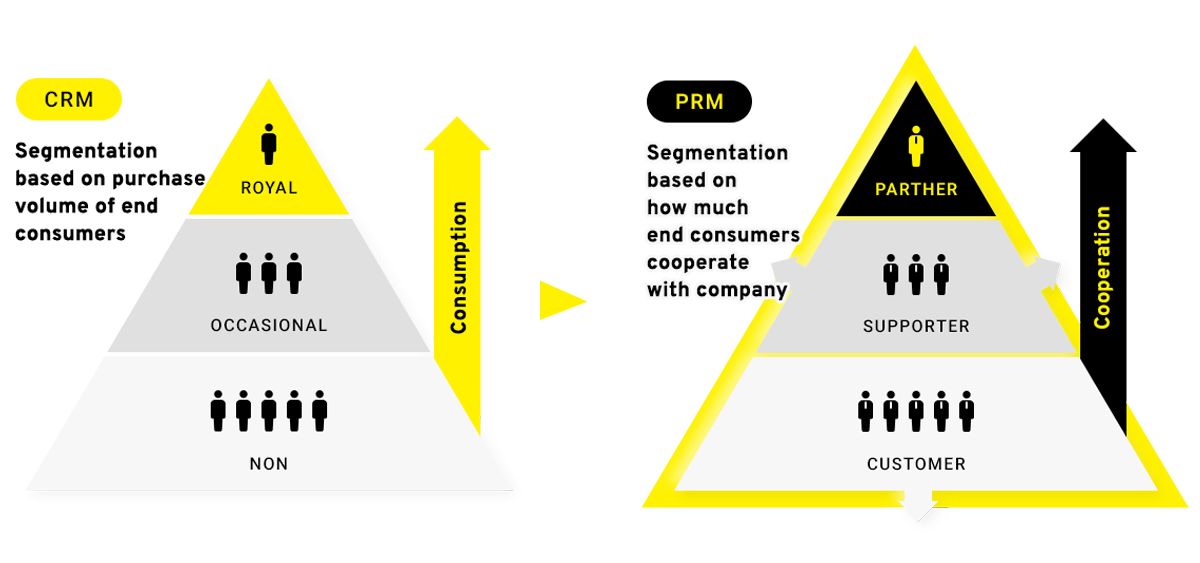
Customer relationship management (CRM) is a long-established concept in the marketing world. According to Pareto's law, 80% of a company's sales are generated by its top 20% of customers, and the emphasis is on strengthening ties with these "loyal customers. Nestle Japan also initially implemented measures based on this CRM approach. To put it simply, they were seeking ways to get their "loyal customers," who were drinking five cups of Nescafe coffee a day, to drink a "sixth cup.
We had no doubt that the person who drank five cups of coffee a day was a "loyal customer," but no matter how hard we tried, it seemed unlikely that he or she would drink a sixth cup.
No matter how much you like a product, you may not be able to buy more of it for various reasons, such as financial circumstances or stomach capacity. When it comes to coffee, you may think, "If I drink six cups of coffee a day, that is indeed too much caffeine.
We at eLife advocate the concept of PRM (partner relationship management) as an alternative to CRM, in which the criterion for a "loyal customer" is the number of products purchased. The standard for a "loyal customer" in CRM is the volume of purchases of a product.
In other words, the idea is that if we can find "partners" who are willing to actively collaborate with the company and develop deeper relationships with them, sales will improve as a result. It is difficult to encourage a person who has already had five cups of coffee to have a sixth cup. However, if you can imagine a person recommending his/her favorite coffee to two or three friends, you can imagine it.
The idea that would later become widely known as the "Nescafe Ambassador" was born from this thinking.
How do companies find "partners"?
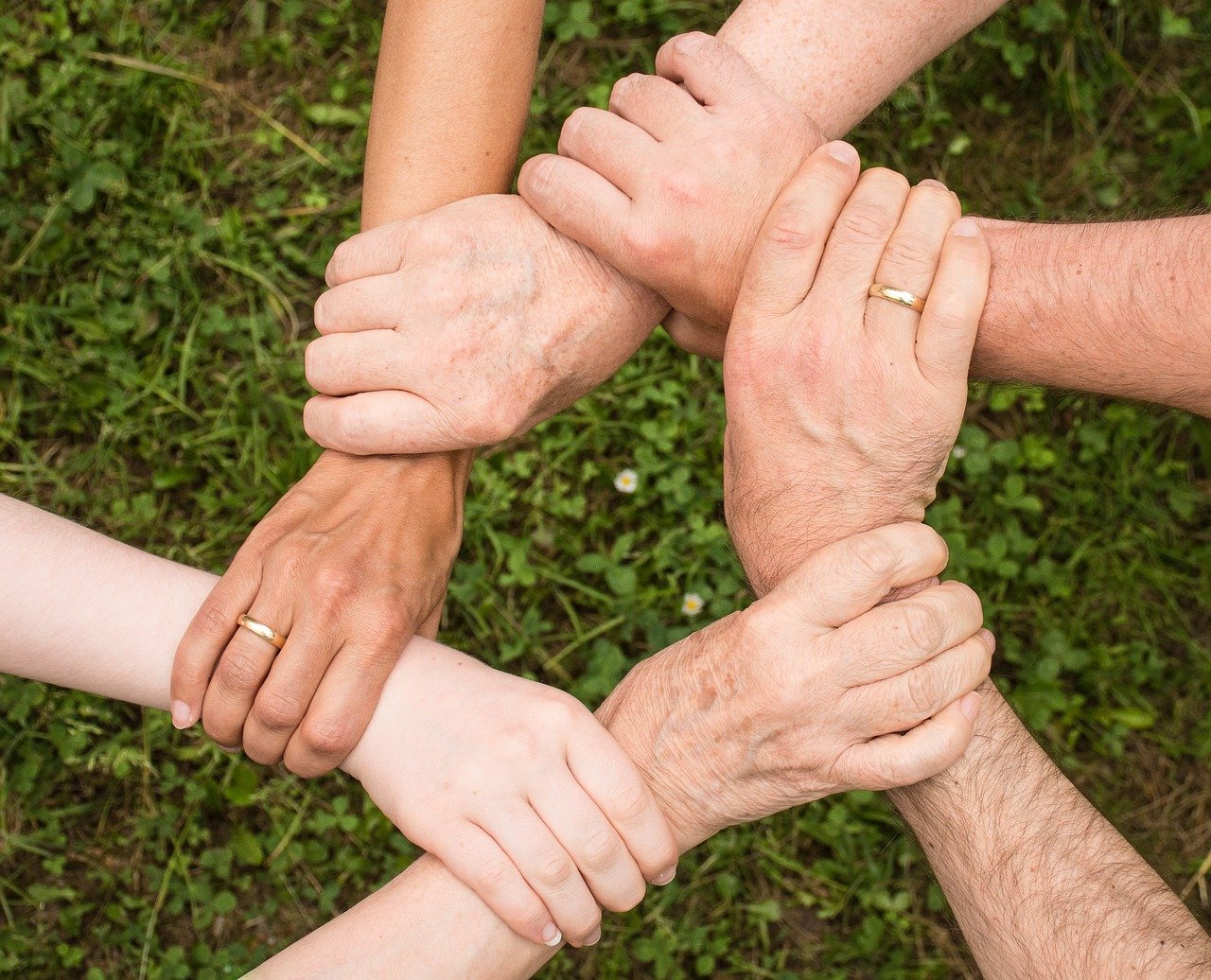
These are the words we use to describe "the consumer is a partner to the company" and the values and ideas behind it.
The concept of "partner" is very close to the concept of " CSA" or "community" as explained in the previous article. Depending on how you look at it, creators who willingly create content within the community and supporters who support the creators' activities can be seen as "partners" who work together with the company on a single project.
Incidentally, in recent years, there has been a lot of talk about how important it is for a company to have a relationship with its fans, who love its products and brands. We believe that "fans" and "partners" are not the same thing.
What we call "partners" are only those who are interested in working with a company on a project. Of course, "people who love and like the brand" may become "partners" as a result, but this does not necessarily have to be the case. Similarly, "loyal customers" in CRM and "influencers" in SNS overlap with "partners" in some parts, but they are not completely the same concept.
In the course of these activities, we are often asked, "How can a company find people to partner with? It is very difficult to generalize this as know-how, but since people's personalities are not always constant, it is quite possible that a person who acts like a "partner" in one place may act like a "fan" or an "influencer" in another place.
Considering the practicality and ease of finding people, we think that initially, we will find people who are "fans" or "loyal customers" or people who gather at places like buzzLifesimply for the motivation of "getting free product samples is a good deal". We believe that it is important to build an ongoing relationship with a certain number of these people who are willing to work with companies.


